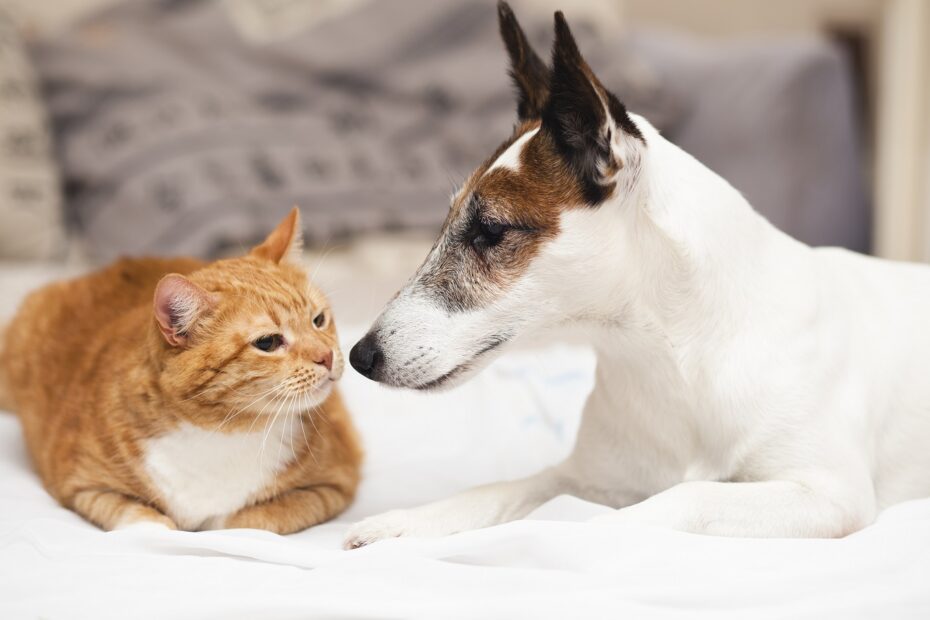If your dog barks at cats, then trust me, they’re not the only one.
Dogs might not be able to talk, but that doesn’t stop them from trying, especially when there’s something small, tailed, and furry involved. Barking, growling, yelping, howling…. you name it, they do it.
Ultimately, barking is nothing more and nothing less than natural canine communication. It’s how they express themselves and their emotions, both to other animals and to us.
And that’s fine… in fact, that’s normal.
What’s not quite so fine is a dog that won’t shut up whenever they come within sniffing distance of a cat.
Whether they bark at them on walks, from out the window, or from the yard, it’s all the same. It’s noisy, it’s disruptive, and it’s likely to be giving everyone within hearing distance a headache.
So, what do you do if your dog’s barking is making them (and you) the talk of the neighborhood?
…What can you do to get them to tone it down?
Ultimately, you’ll never be able to stop a dog barking completely. It’s the equivalent of trying to stop a toddler from chatting. Even if you did somehow succeed, it’s not necessarily going to lead to health and happiness.
Everything and everyone needs a way to communicate. Barking is simply a dog’s method of choice. That said, there’s a world of difference between normal, healthy barking and excessive, unrestrained barking.
And it’s that second kind we’re talking about here.
Feeling the need to bark constantly and uncontrollably around cats probably isn’t making your dog that happy. Look at their tense, rigid body language when they do it. Do they look like they’re having the time of their life to you?
…Probably not.
Teaching your dog how to modify their behavior won’t just make your life more peaceful; it’ll do the same for theirs. They might not necessarily grow to love cats, but they will at least be able to pass one by without turning into a loon.
But is it possible? Can you really get them to kick the habit?
The good news? …You can.
…The even better news? There’s a way you can start doing it right now.
Take a moment to check out the 5 step-by-step calming exercises from the Online Dog Trainer, Dan Abdelnoor. (see video below)
Designed to help any dog master their emotions, the exercises will make a big difference to excessive barking and other problematic behavior. Practice them consistently, and you’ll soon be saying hello to a calmer, more mature pooch.
Here’s the link to take a look: Click Here To Discover 5 Step-By-Step Calming Exercises To Finally Stop Your Dogs Obsessive, Annoying Barking Habit… Even If You’ve Tried & Failed Before!
(video will open in a new window)
Why Does My Dog Bark at Cats?
As with most problems, the first step in tackling excessive barking is to understand what’s making your dog bark in the first place. It may seem like extra work, but taking the time to understand the ‘why’ will make figuring out the ‘how’ of solving it much easier.
Although every dog is unique, most excessive barking (at least when cats are involved) can be explained by the following:
Your Dog Has a Strong Prey Drive
Dogs aren’t aware of some ancient battle between cats and dogs. They aren’t barking at them because they’re cats or because they object to them on principle.
To them (or at least to dogs with a strong prey drive), cats are simply prey. No more, no less. And like everything a dog considers prey, they’re going to become very, very focused on it.
Their posture will stiffen, they’ll adopt a steely gaze, and they’ll start whining and barking.
When the cat reacts by running away, it simply serves to heighten the dog’s emotions. The prey is on the move… and if there’s one thing a dog loves even more than a full food bowl, it’s chasing things that run away.
The problem is, there might be a fence, a wall, or a leash blocking their path. If they get frustrated at not being able to satisfy their urges, you can bank on even more barking than ever.
Your Dog is Alerting You
Some dogs can’t see a leaf without wanting to alert you to the fact. It’s not that they doubt your own powers of observation. It’s just they know theirs are better.
Whether it’s a mailman at the door, a neighbor in the yard, or a rainbow in the sky, they’re going to tell you.
When a dog barks at a cat, they aren’t just barking for no reason. They’re telling you, “Look, cat! Over there!”
After all, you probably haven’t spotted the cat yet…. and that’s a situation no alert barker will let continue for long.
Your Dog is Defending their Territory
Some dogs don’t bark at cats specifically because they’re cats. They bark at them because cats have no manners. After all, no polite, upstanding citizen would enter someone else’s territory without asking first.
Unfortunately, that’s exactly what every cat that runs along your fence, hops in your tree, or skitters across your yard is doing, at least in your dog’s eye.
No matter how cute and cuddly a dog is, never underestimate just how fierce their instinct to defend their home can be. If they have territorial tendencies, any cat that enters their patch is going to get a lesson they probably weren’t expecting.
Your Dog Hasn’t Been Socialized
Dogs need to be socialized to get familiar and comfortable with a wide range of social situations. If they’ve led a sheltered life, they might not know how to interact with and behave around new people, places, and pets.
If your dog tends to become anxious, aggressive, or moody whenever they come across something new. Their behavior around cats might simply be down to a lack of social skills.
Related Post: How To Socialize An Aggressive Dog – A Step By Step Guide

How to Stop Your Dog Barking at Cats
Exessive barking might be frustrating, but it’s not inevitable. Providing you’re willing to commit to training, you’ll find a range of techniques available that will help your dog abandon their old habits and adopt some new ones.
Before I touch on a few of those techniques, I’d recommend taking a few minutes to catch up with these 5 step-by-step calming exercises.
Regardless of what the reason for the barking is and what the solution will be, the one thing every problematic barker will benefit from is a little self-control.
So make the exercises a regular part of your routine, and you’ll soon notice a marked improvement in your dog’s behavior and attitude.
Avoid Punishment
Before we get into the techniques you can use to discourage barking, it’s worth highlighting the things you should never do, no matter how frustrating the barking gets.
For most people, the immediate reaction to a barking dog is to shout at them to be quiet. It’s a natural enough response, but an incredibly ineffective one.
Either your dog will feel threatened, or they’ll think you’re simply adding to the chorus.
Neither one is ideal, and neither one is going to stop your dog barking. Set an example by keeping your voice calm and low, and your movements controlled and relaxed.
The other thing you should never do is punish your dog for their behavior. Anti-bark collars that administer an electric shock are unnecessarily aggressive, and will only work to suppress your dog’s natural behavior instead of stopping the problematic aspects of it.
Instead of scolding or punishing your dog, work out why they’re barking instead.
…Is it because they’re bored or frustrated?
…Are they alerting you to the cat’s presence, or even trying to defend your home from it?
Once you’ve figured out the cause, you can start working on the training techniques that will offer a long-term solution.
Avoid Their Triggers
If cats make your dog bark, then there’s one very easy, very quick way to stop the noise. And that is to stop the cats.
Now, obviously, turning your neighborhood into a cat-free zone isn’t going to be easy. It may even be illegal.
Fortunately, it’s not actually necessary. You don’t have to get rid of the cats, you just need to keep your dog away from them.
If you’re dealing with an alert barker or a territorial dog that likes to sit at the window and bark at every passing cat, simply close your curtains.
If they’re persistent, you might have to go one step further and put a guard in front of the window to stop them from accessing it.
If they have access to a yard, try replacing link fencing with something tall and solid enough to block their view of the street.
Related Post: My Dog Barks At Everything – How To Quite A Noisy Dog

Distract Them
Very few dogs are so committed to barking that they won’t stop if you give them something better to do. Next time your dog spots a cat, jump in with a toy or something to chew on.
With any luck, they’ll get so engrossed in their new activity, they’ll forget all about the cat.
If you want to make the approach even more effective, teach them the ‘enough’ cue. Scatter some treats on the floor and say, ‘enough.’ Keep practicing.
Once they start looking down as soon as you give the cue, start using it to distract them whenever they bark. Once they’ve gobbled up the treats, hold their attention for a few more minutes with a game or a toy.
By the time the game has finished, the cat should be safely out of sight.
Exercise Them
A tired dog is a happy dog. If your dog is barking out of boredom or frustration, increasing their daily activity can have a dramatic (and positive) effect on their behavior.
Try to work in a few more walks into their daily routine. If you’re away from home for most of the day, it’s worth getting a friend or dog walker to pop by to break up their day with some healthy exercise.
Don’t forget games either – throwing a frisbee around the yard or indulging them with a session of tug of war is a great way to burn off some steam.
Teach Them a Recall
If your dog barks at cats when they’re in the yard or out and about. Teach them a recall to encourage them to turn their attention away from the cat and onto you.
Remember to use plenty of positive reinforcement and rewards – the more motivation you can give them to come to you rather than woof, the better.
Socialize Them
A dog will always bark at something they haven’t been properly introduced to. If they’re raised around other animals, they’ll come to see them as part of the pack rather than as something that’s a threat.
Although socializing dogs is best done at an early age, it’s never too late to start. When you’re introducing them to new things, stay calm and offer plenty of reassurance and praise to create positive associations.
Teach Them Control
In fairness, teaching self-control isn’t something that’s only going to benefit problematic barkers. After all, no dog is immune to letting their emotions run away with them from time to time.
Whether they get over-excited around visitors, anxious around strangers, or simply can’t resist barking at every cat, dog, and bird they come across. These 5 step-by-step calming exercises will teach them how to deal with any situation in a calm, controlled manner.

Wrapping Things Up
Dealing with an excessively noisy dog can be a literal headache. Fortunately, it’s not a problem you have to put up with.
Identify the cause, implement the solution, and before long, peace will reign supreme.
Just remember to keep things positive, avoid punishment, and keep practicing. Regardless of what training technique you use, the more consistent you are with it, the sooner you’ll see results.

